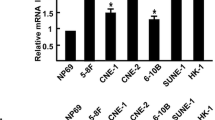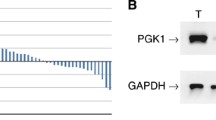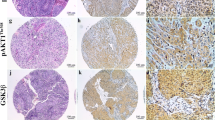Abstract
Acylglycerol kinase (AGK) had been shown to contribute to cancer progression and unfavorable clinical outcomes of patients. Our study aimed to investigate the expression pattern and clinical significance of AGK in patients with early-stage cervical squamous cell cancer (CSCC). The protein and messenger RNA (mRNA) expression of AGK was analyzed in six cervical cancer cell lines and four paired early-stage CSCC specimens and normal cervical tissues (NCT), using Western blotting and real-time PCR (RT-PCR). And we investigated the AGK protein expression in paraffin-embedded specimens from 140 patients with early-stage CSCC and 30 cases of NCT by immunohistochemistry (IHC). Statistical analyses were performed to evaluate the clinicopathological significance of AGK expression. The expressions of AGK protein and mRNA were significantly up-regulated in cervical cancer cell lines and cancer tissues. IHC analyses revealed that AGK was highly expressed in 93 (66.4 %) of 140 early-stage CSCC specimens, but in none of the NCT. Moreover, AGK expression in early-stage CSCC was significantly correlated with tumor stage (P < 0.001), tumor size (P < 0.001), and tumor type (P < 0.001). Early-stage CSCC patients with high AGK expression level had shorter progress-free survival (PFS) and overall survival (OS) time compared with patients with low AGK expression levels. Univariate and multivariate analyses identified AGK expression level as an independent prognostic factor for survival of early-stage CSCC patients. We showed that AGK was over-expressed in cervical cancer cell lines and clinical tissues, and over-expression of AGK was associated with poor survival outcomes of early-stage CSCC patients. AGK can be used as an independent prognostic marker for early-stage CSCC.




Similar content being viewed by others
References
Jemal A, Bray F, Center MM, Ferlay J, Ward E, Forman D. Global cancer statistics. CA Cancer J Clin. 2011;61:69–90.
Kodama J, Seki N, Masahiro S, Kusumoto T, Nakamura K, Hongo A, et al. Prognostic factors in stage IB–IIB cervical adenocarcinoma patients treated with radical hysterectomy and pelvic lymphadenectomy. J Surg Oncol. 2010;101:413–7.
Lei T, Mao W, Lei T, Dai L, Fang L, Chen W, et al. Incidence and mortality trend of cervical cancer in 11 cancer registries of China. Chin J Cancer Res. 2011;23:10–4.
Sedlis A, Bundy BN, Rotman MZ, et al. A randomized trial of pelvic radiation therapy versus no further therapy in selected patients with stage IB carcinoma of the cervix after radical hysterectomy and pelvic lymphadenectomy: a Gynecologic Oncology Group Study. Gynecol Oncol. 1999;73:177–83.
Curtin JP, Hoskins WJ, Venkatraman ES, et al. Adjuvant chemotherapy versus chemotherapy plus pelvic irradiation for high-risk cervical cancer patients after radical hysterectomy and pelvic lymphadenectomy (RH-PLND): a randomized phase III trial. Gynecol Oncol. 1996;61:3–10.
Samlal RA, van der Velden J. Early cervical carcinoma: how to manage high-risk patients after radical hysterectomy. Eur J Obstet Gynecol Reprod Biol. 1999;85:137–9.
En-lin S, Sheng-guo C, Hua-qiao W. The expression of EFEMP1 in cervical carcinoma and its relationship with prognosis. Gynecol Oncol. 2010;117(3):417–22.
Garg M, Kanojia D, Saini S, Suri S, Gupta A, Surolia A, et al. Germ cell-specific heat shock protein 70-2 is expressed in cervical carcinoma and is involved in the growth, migration, and invasion of cervical cells. Cancer. 2010;116:3785–96.
Noordhuis MG, Fehrmann RS, Wisman GB, Nijhuis ER, van Zanden JJ, Moerland PD, et al. Involvement of the TGF-ß and ß-catenin pathways in pelvic lymph node metastasis in early-stage cervical cancer. Clin Cancer Res. 2011;17:1317–30.
Kumar V, Behera R, Lohite K, Karnik S, Kundu GC. P38 Kinase is crucial for osteopontin-induced furin expression that supports cervical cancer progression. Cancer Res. 2010;70:10381–91.
Liao CJ, Wu TI, Huang YH, Chang TC, Wang CS, Tsai MM, et al. Glucose-regulated protein 58 modulates cell invasiveness and serves as a prognostic marker for cervical cancer. Cancer Sci. 2011;102:2255–63.
Bektas M, Payne SG, Liu H, Goparaju S, Milstien S, Spiegel S. A novel acylglycerol kinase that produces lysophosphatidic acid modulates cross talk with EGFR in prostate cancer cells. J Cell Biol. 2005;169:801–11.
Mouh MA, Wu XX, Okazoe H, Tsunemori H, Haba R, Abou-Zeid AM, et al. Expression of autotoxin and acylglycerol kinase in prostate cancer: association with cancer development and progression. Cancer Sci. 2009;100:1631–8.
Wang X, Lin C, Zhao X, Liu A, Zhu J, Li X, et al. Acylglycerol kinase promotes cell proliferation and tumorigenicity in breast cancer via suppression of the FOXO1 transcription factor. Mol Cancer. 2014;13:106.
Chen X, Ying Z, Lin X, Lin H, Wu J, Li M, et al. Acylglycerol kinase augments JAK2/STAT3 signaling in esophageal squamous cells. J Clin Invest. 2013;123:2576–89.
Murph MM, Hurst-Kennedy J, Newton V, Brindley DN, Radhakrishna H. Lysophosphatidic acid decreases the nuclear localization and cellular abundance of the p53 tumor suppressor in a549 lung carcinoma cells. Mol Cancer Res. 2007;5:1201–11.
Saunders JA, Rogers LC, Klomsiri C, Poole LB, Daniel LW. Reactive oxygen species mediate lysophosphatidic acid induced signaling in ovarian cancer cells. Free Radic Biol Med. 2010;49:2058–67.
Wang FQ, Ariztia EV, Boyd LR, Horton FR, Smicun Y, Hetherington JA, et al. Lysophosphatidic acid (LPA) effects on endometrial carcinoma in vitro proliferation, invasion, and matrix metalloproteinase activity. Gynecol Oncol. 2010;117:88–95.
Park SY, Jeong KJ, Panupinthu N, Yu S, Lee J, Han JW, et al. Lysophosphatidic acid augments human hepatocellular carcinoma cell invasion through LPA1 receptor and MMP-9 expression. Oncogene. 2011;30:1351–9.
Cui Y, Lin C, Wu Z, Liu A, Zhang X, Zhu J, et al. AGK enhances angiogenesis and inhibits apoptosis via activation of the NF-κB signaling pathway in hepatocellular carcinoma. Oncotarget. 2014;5(23):12057–69.
Acknowledgments
This work was supported by a grant from the International Science & Technology Cooperation Program of China (2014DFA30180 to Y.M.), grant from the State Key Development Programs of China (2012CB966502 to Y.Y. and Y.M.), grants from the National Natural Science Foundation of China (81471464 to Y.Y.; 30860103, 81060175, and 81460034 to Q.L.; 81260032, 81060016, and 31140021 to Y.M.), grants from Guangdong Provincial Department of Science and Technology (2011Y2-00019 and 2012GJHZ0006 to Y.Y.), grants from the Key International Cooperation Program of Science and Technology Department of Hainan Province (GJXM201106 to Y.M. and KJHZ2014-11 to Q.L.), grant from the key program of Hainan Province (ZDZX2013003 to Y.M.).
Author information
Authors and Affiliations
Corresponding authors
Ethics declarations
Conflicts of interest
None
Additional information
Fei Sun, Ying Xiong, Yan-Lin Ma and Yan-Hong Yu contributed equally to this work.
Rights and permissions
About this article
Cite this article
Sun, F., Xiong, Y., Zhou, XH. et al. Acylglycerol kinase is over-expressed in early-stage cervical squamous cell cancer and predicts poor prognosis. Tumor Biol. 37, 6729–6736 (2016). https://doi.org/10.1007/s13277-015-4498-4
Received:
Accepted:
Published:
Issue Date:
DOI: https://doi.org/10.1007/s13277-015-4498-4




